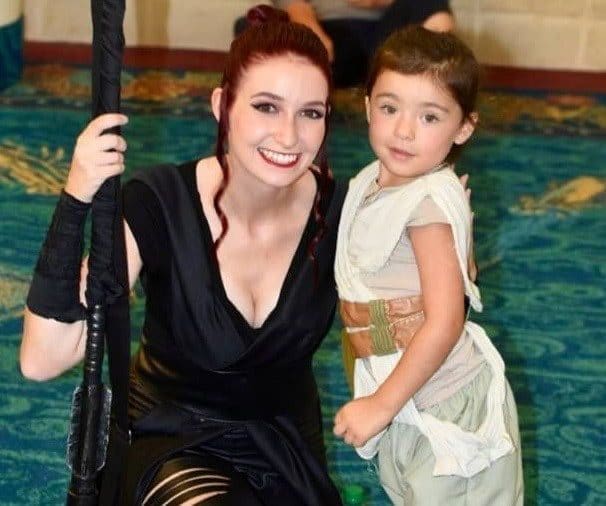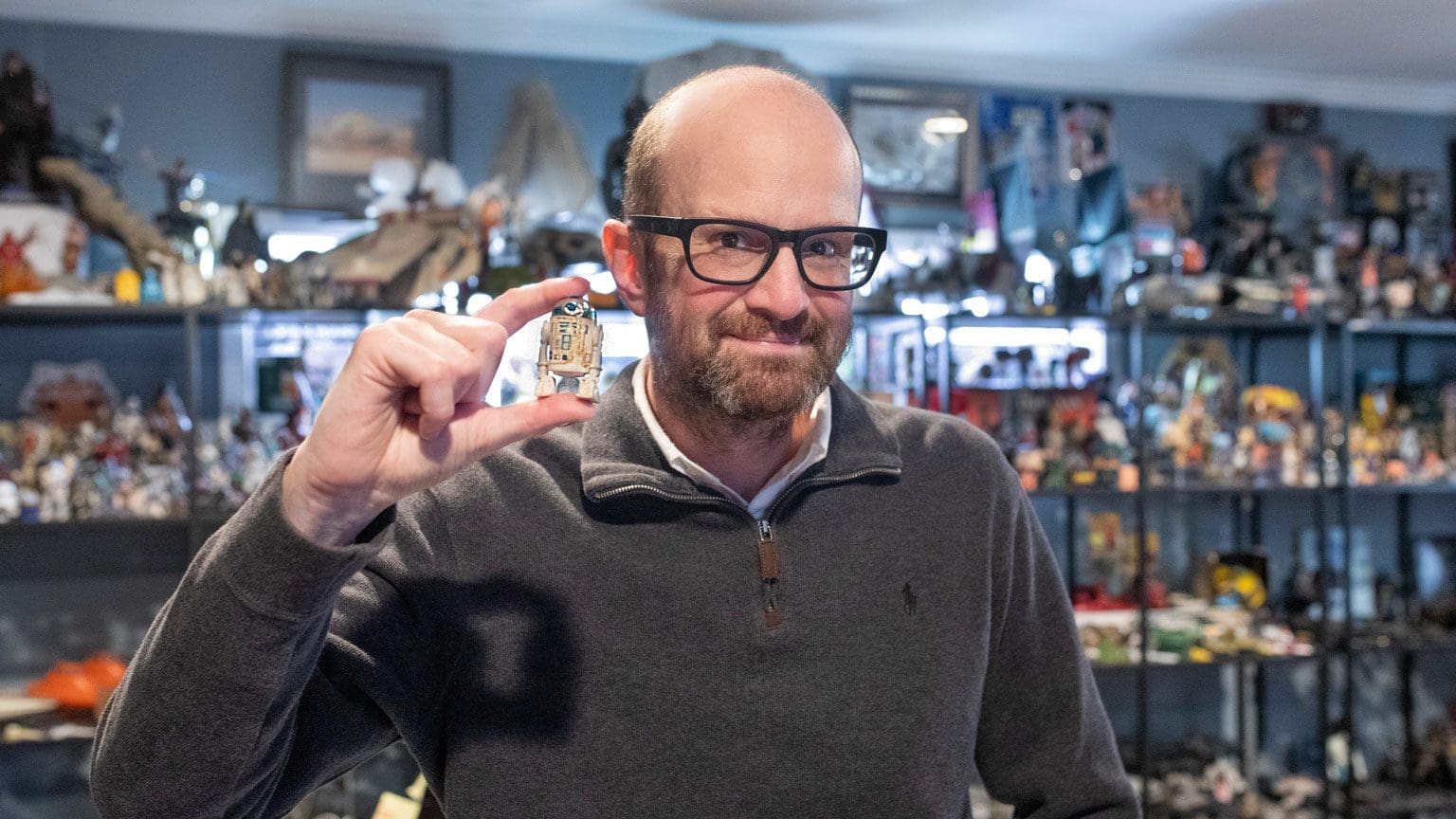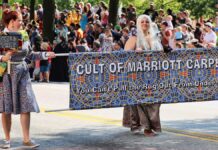Is everything you’ve heard about comic conventions confirmed, plausible, or busted?
Coming Clean
I should admit, as I begin to write this, that I didn’t attend my first convention (MegaCon in Orlando, Florida) until I was on the downhill side of 38. I, like millions of other people, had heard what people said about conventions…
“I don’t like comic books, so why would I go to a comic convention?”
“I hate [insert stereotypically geeky thing like comic books, sci-fi, or video games] so why would I go?”
“You have to pay so much just to meet a bunch of has-beens sitting around at tables.”
“It’s a bunch of smelly nerds dressed up in Star Wars and Star Trek stuff.”
Again, I must admit, I understood why people said those things about conventions. Even on shows like Big Bang Theory and in movies like Galaxy Quest, that are supposed to support the geeks and the nerds of the world, comic conventions are depicted as events only for the super-nerdy and socially awkward, where geeks wearing tape-covered glasses ask super-obscure questions to celebrities who’d rather be anywhere else. My view of cons was based largely on the extremes. On one hand, I knew about San Diego Comic Con, where thousands and thousands of overenthusiastic geeks descended on San Diego to learn about the newest happenings in television, movies, and the like. On the other hand, as I mentioned, I knew about the stereotypical small “comic book convention,” where five or six sci-fi nobodies (like “Storm Trooper #29” and “Arrow-Through-the-Head Zombie”) sat at card tables while people in Party City costumes walked through what looked like a giant flea market with broken Transformers, old comic books, and other geek flotsam and jetsam.
To be honest, I really only went to my first convention because some of the actors from The Walking Dead were going to be there, and I thought it would be cool to get a picture or two. I had no inkling of what a comic convention entailed, but I would soon learn that it was so much more than folks who had never attended comic conventions would say about them.
Before We Begin
After that first convention in 2014, I’ve attended about a dozen or so cons in Florida and Georgia. I think I have a pretty good feel for them, and I think I can formulate a case to bust many of the myths you’ve probably heard about them. At the very least, if I can’t bust a myth, I can provide some context as to why people think or feel a particular way about them.
In addition to the fact that I’ve attended a good number of conventions, I have one additional qualification as far as busting the myths of conventions. I bear a striking resemblance to Jamie Hyneman from MythBusters…do with that what you will. So, without further ado, let’s bust some of the most popular myths about cons!

Myth #1: It’s All About Star Wars, Star Trek, and Comic Books!
I think most people think one of two things when they hear the word, “convention,” despite the other words in the title of the convention. They either think of a work-related event during which people in a similar field (like salespeople, lawyers, dentists, or pool cleaners) get together and mostly get drunk and say they’re learning stuff or they think of a bunch of dorks who like science-fiction and comic books dressing up and speaking in Klingon. However, “comic cons,” as they used to be called, are becoming less centered on sci-fi and comic books and more focused on all things pop culture. For example, one convention I’ve attended and for which I’ve volunteered, Fanboy Expo, features actors in almost every genre of movie and television, wrestlers, and musicians among the typical voice actors, artists, and sci-fi folks. A Florida-based convention, MegaCon, has also widened their focus, inviting actors from all movie and television genres, along with wrestlers, and other celebrities, artists, and authors. Those are just two examples, but there are countless examples of conventions expanding their focus, going so far as removing the word “comic” from their titles. Sure, some of these conventions focus on sci-fi and comic books, but there are many that are more widely focused on all things pop culture, with something for everyone.
In addition to most people misunderstanding the topical focus of pop culture-related conventions, they also misunderstand what it’s like to walk around a comic con. Unlike the stereotypical comic con, where it’s just a bunch of quasi-celebrities sitting around waiting for overeager fans to ask for pictures and not much else, conventions have become so much more. At MegaCon, for example, you participate in cosplay contests, attend panels where fans can ask questions of their favorite celebrities, learn how to draw or write your own comic books, get a tattoo, buy art or books from an up-and-coming author or artist, watch short and/or independent films by new writers and directors, attend themed parties, take part in speed dating, and play games with fellow nerds. In addition to all of those cool things to do, see, and experience, this year’s MegaCon has guests from Back to the Future (admittedly sci-fi, but certainly mainstream sci-fi), The Goonies, Smallville, and Boy Meets World. In addition to the celebrities, there are so many opportunities to meet and interact with cool people with similar interests, that simply saying that comic conventions are all about sci-fi and comic books hardly do them justice. In one comic convention alone, I got to meet a local author that chatted with me about reading and writing (and signed my book), talk to a local artist who did a commission for me, attend a Q&A with WWE superstar John Cena (who was a lot more interesting and funny than I thought he’d be), play some vintage video games (I crush at Goldeneye for N64), and watch a few short horror films. That doesn’t mention the photo ops and the autographs I got from my favorite movie and television stars.
So, if your nerdy friend tells you about an upcoming convention and you think it’s nothing but Star Wars, Star Trek, and old comic books, maybe ask a couple questions before dismissing it…you could be missing out on something that you’re truly a fan of.
Myth #2: Comic Book Conventions are for Nerds!
I’ve always been more in the nerd/geek camp than I have in any other camp. Since I’m a child of the 80s and 90s, some of the cliques of my day were jocks, goths, surfers, skaters, stoners, and nerds. Since I liked video games, comic books, sci-fi, wrestling, and action figures, I was pretty much destined to be a nerd. As I’ve aged, I’ve still maintained my nerdiness, but it’s mixed in amongst other interest. That being the case, I didn’t think, as a “grown up,” that I would really enjoy comic conventions. I had it in my mind that comic book conventions were just humongous crowds of black-clad preteens, teens, and adults (who non-convention-attendees probably think are the weirdest of all). And those who weren’t dressed in all black were dressed in old, unwashed Spock costumes.
When I finally decided to brave a comic convention, one of the first things I learned is how diverse the crowd is. I’ve seen families, couples, groups of friends, kids, teens, adults, and even members of the 70-and-up crowd in attendance. In some cases, families will dress up in coordinating costumes, like The Incredibles. I saw an incredible family cosplay where all family members were dressed up as characters from Fallout: New Vegas; dad was Boone, mom was Rose of Sharon Cassidy, and their baby was Benny. My friend, Jim, and his kids love Star Wars, so his son dresses up like a Jedi. Sure, there are the stereotypical folks attending, but it’s just a small group of a much larger cross-section from every age group and social group. Since conventions have widened their focus, there are things to do, see, and experience that cater to fans of almost every genre of movie and television show.

Simply put, conventions aren’t just for kids and fans of Star Wars, Star Trek, and comic books. Conventions are for fans of television, music, movies, books, science, arts, crafts, clothes, jewelry, and countless other things that are just plain fun. All conventions are different, and some are more focused on sci-fi or specific nerdy things (like Walker Stalker Con is focused on The Walking Dead); just do your homework, hop on Google and learn about the conventions your friends are attending. You might find out that you like it, and it won’t be as scary as you think!
Myth #3: It’s Just a Bunch of Has-Been Actors Sitting at Card Tables.
As I aged, I so strongly believed the myths of conventions that I didn’t even bother doing my due diligence when it came to learning about them. Thankfully, with the advent and ascent of social media, it was tough to not learn about conventions. When Walker Stalker Con was advertised on my Facebook feed, I was intrigued. As I did more research, I realized that I was wrong when it came to the celebrities who attended these conventions. Norman Reedus, Andrew Lincoln, and Danai Gurira were all there, as were The Walking Dead stars such as Michael Rooker and Jeffrey DeMunn, who had solid acting careers before the show, were in attendance. Sure, there were “D-list” folks there, as well, but it was a great mixture that really catered to fans.
In the conventions I’ve attended since, I’ve realized that most conventions, especially the heavy hitters like MegaCon, have a great mixture of big names and lesser-known folks that still cater to fans of a specific show or genre. I’ve also realized that while some folks might think that the guy who played Ewok #27 or the woman who played a crew member on Star Trek for one episode might not be worth going to see, those folks are always the ones that are the happiest to talk about their experiences, and they can have some great stuff to say. Just because the person sitting at the table isn’t William Shatner, Jason Momoa, or Brie Larson, it doesn’t mean that they don’t have cool stories to share or anything awesome to say.
And, as I mentioned earlier, in addition to chatting with and taking pictures with actors, there are vendors, artists, authors, and content creators to talk to and learn from. You can even learn a thing or two from other attendees; sometimes they have stories that are pretty amazing, too. I’ve even made friends who have given me advice and helped me with projects I’ve wanted to start. (Shout out to author Russell James…you can check out his work right HERE.) No matter what you’re interested in, as it relates to pop culture, you can find someone who has a story or advice to share, or some piece of merchandise or memorabilia that can scratch your fandom itch.
So, to sum up this myth…yes, some of the folks that are guests at comic convention are a little on the obscure side. However, even the folks that you’ve never heard of can mean the world to someone else. Some smaller conventions only get guests that are on the fringes of celebrity; however, folks that might have only played a small role in a movie or someone that might’ve written a book you’ve never heard of might have a great story and some great advice that might mean the world to the right person. However, in addition to these “hidden gems,” conventions are gaining in popularity and big-name celebrities are beginning to attend them. If you do your research and learn more about conventions, you’ll find that they’re become a major way for celebrities to get the word out about their projects (and, let’s be honest, make a great deal of money signing pictures and tchotchkes).
Myth #4: Everything’s So Expensive…It’s Just Not Worth It!
Soooo, now we’re getting to the myth that I can’t truly bust in its entirety, because it’s kinda’ true. However, I am going to take a few minutes to make my case for value vs. cost. Yes, to a large portion of the population, taking a picture with Stan Lee (Rest in Peace, Stan. You were an inspiration to every nerd in the world.) and paying $100 or more to do it is a little pricey. However, if you were a kid that might’ve been shy or bullied growing up and comic books were your escape, Stan Lee and the heroes and worlds he created probably meant everything to you. It’s funny to listen to people say they wouldn’t pay $100 for someone’s autograph, but they don’t have a problem dropping $100 in an evening of drinking at a bar…and they don’t even remember doing it the next day. It’s not about the cost of the experience, but it’s the value to you. That $50 autograph from a celebrity you’ve never heard of could be priceless to someone who went on their first date with their significant other to a movie that the celebrity starred in. Again, value vs. cost…it’s all subjective. We all have things we consider valuable, and conventions offer up unique opportunities that might be cost a lot, but are worth so much more.

Of course, it’s not all about expensive autographs and pictures at conventions. You can buy almost anything, from costly memorabilia to inexpensive things like shirts and lanyards that show off your fandom. You can buy books from up-and-coming authors for $10 or less. You can have an artist draw you a commissioned piece of art for less than $50. You can talk to artists, authors, cosplayers and some celebrities for free. While you can do more if you’re willing to spend money, you can also have a great time, meet some great people, and make some great memories and spend less than $100. Considering a day at Disney World will cost you more than that, a day at a convention isn’t all that much of an investment.
So, sure, conventions can be expensive if you want to do and see everything, but you can do some really great things even if you’re not willing to take out a second mortgage or sell one of your least favorite children. Just remember, though, that the money you spend at a convention will get you an experience that you may never have again…and that’s worth more than the money you’re paying. Like Warren Buffett says, “Price is what you pay. Value is what you get.”
Wrapping Things Up
If you’re like I used to be and you think conventions are for pretending to work and getting drunk or walking around a bunch of geeks dressed like Captain Kirk, you’re really missing out. Conventions are pretty amazing events that can be an incredible way to spend a weekend. You can do and see so much and potentially experience things you may not have a chance to experience again. Anyone who got a chance to speak to and thank Stan Lee for all his incredible creations can tell you what a rush it is to meet the man. Now, we won’t have the chance to do that ever again. Conventions have become places where people who are nerds of any sort, from comics and video games to music to books, can get together and share common interests, meet people who are important to them, and experience things that they would rarely get an opportunity to experience.

So, if someone tells you that you’re a geek or immature for going to a “comic book convention” or they give you a hard time for spending money on an autograph or a selfie, just point them toward this article. Tell them that you can’t put a price on fandom. Whether it’s season tickets to a football game, or a hundred dollars for an expensive bottle of wine, or thousands of dollars for a nice watch, or a few hundred dollars for a weekend at a convention, it’s not about what it cost, but what it’s worth.
If you’ve never gone to a convention before, give one a shot. Go with a friend; conventions are better if you have a friend to share the experience with. Have fun, see everything, talk to people, buy things you really don’t need, attend a panel, watch a movie, meet a celebrity, get a good meal; just be a kid…or a grown-up who’s never really grown up. Conventions, like almost everything else we do, are as much fun as you make them. Have an open mind and don’t fall prey to the myths of conventions and you’ll have a great time, stories to tell, and memories forever.


































